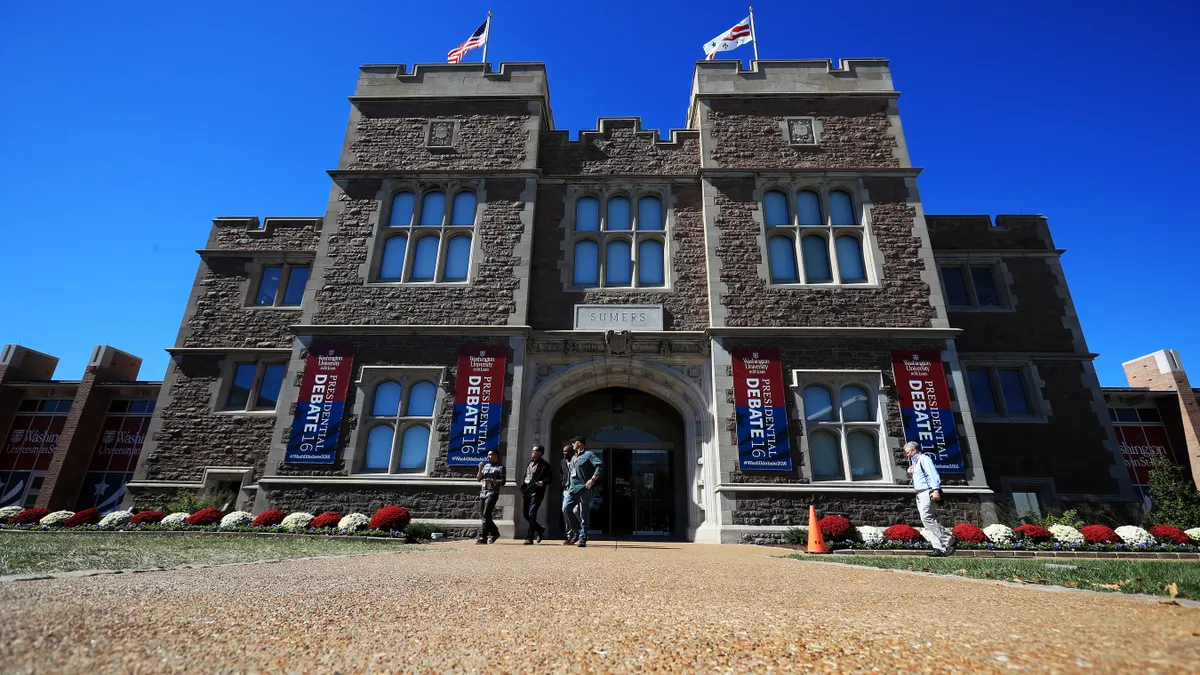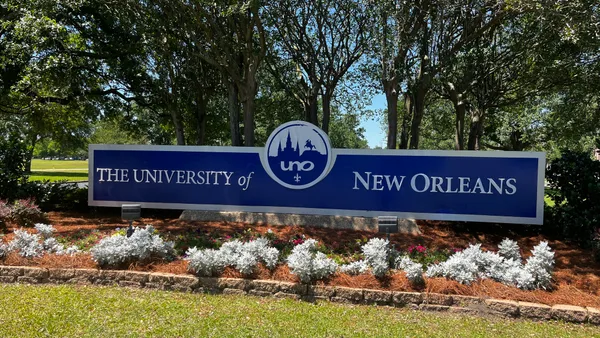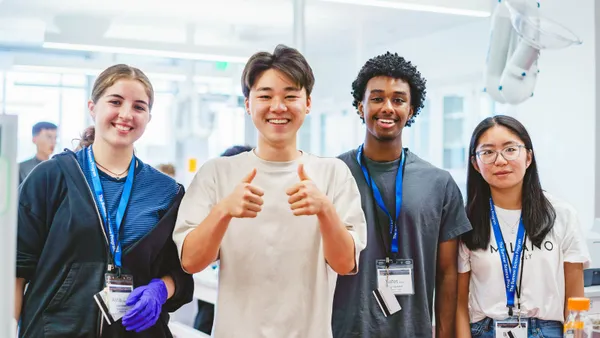Dive Brief:
- Washington University in St. Louis will start admitting first-time, full-time domestic undergraduate students on a need-blind basis, it announced Monday. WashU joins a small number of wealthy institutions that don't consider applicants' ability to pay when deciding whether to accept them.
- The need-blind policy is part of $1 billion the university is setting aside for student financial aid. Endowed funding of $800 million will go to need-blind undergraduate admissions, and $200 million is being set aside for financial aid for graduate and professional students.
- The private, nonprofit university is adopting the policy immediately, meaning it will cover students in the current admissions cycle seeking to join the class of 2026. It will also meet 100% of admitted undergraduates' demonstrated financial need.
Dive Insight:
Colleges can be leery of need-blind admissions policies, which make controlling financial aid budgets more difficult. The combination of need-blind admissions and meeting full demonstrated need can become expensive quickly.
The combination can be so costly that colleges often drop need-blind admissions policies after adopting them. The College of the Holy Cross in Worcester, Massachusetts, stepped back from need-blind admissions in 2019, citing budgetary concerns. It had gone from awarding $49 million in financial aid in the 2014-15 school year to awarding $67 million, officials said at the time. Haverford College in Pennsylvania walked back its need blind policies in 2016.
Other schools have adopted need-blind admissions following substantial windfalls, such as Johns Hopkins University, which went need-blind and eliminated loans as part of financial aid packages after Michael Bloomberg gave it $1.8 billion for financial aid in 2018.
Massive endowment growth fueled WashU's new need-blind policy, it said. The university pointed to a 65% rate of return in the 2020-21 fiscal year, which made possible the new $1 billion financial aid investment.
WashU was already one of the wealthiest institutions in the country. It had the 15th-largest endowment in the U.S. and Canada in 2020, according to an annual study from the National Association of College and University Business Officers and TIAA.
The university's endowment, then valued at $8.4 billion, was worth more than $580,000 for every full-time equivalent student enrolled.
WashU's chancellor, Andrew Martin, committed to finding the necessary funding for need-blind admissions in an inaugural address two years ago. In a statement, he called Monday's announcement a proud moment, but said the university has more to do.
"Admitting the best students from all socio-economic backgrounds is obviously the first step," Martin said. "Making sure they have the support and resources to succeed once they're here is also critical."
Admissions officers worked hard over the last year to run models to determine whether the university could make a need-blind policy work, said Ronné Turner, WashU's vice provost for admissions and financial aid. They looked at factors such as how the applicant pool might change and how much the university's financial aid budget is likely to grow.
"It's a game-changer for us to be able to evaluate students on their accomplishments, their achievements, whether they are a fit for our community and their strong personal characteristics," Turner said. "Our old need-aware policy prevented us from admitting all of the students we wanted to admit because we would just run out of financial aid."
The new policy comes with some limitations. It doesn't apply to transfer students, international students or waitlisted students, all of whom will still be considered on a need-aware basis, Turner said.
WashU also considers its "community members" when releasing admissions decisions, she added. That includes noting legacy status — applicants whose parents attended the university — and if an applicant's parents work for the institution. But the university is admitting qualified students, and the impact of those policies is "not what people think it is," Turner said.
The university has changed some other policies to make its admissions processes more accessible. Like many of its peers, it extended a pandemic-era suspension of test-optional admissions policies for the 2021-22 admissions cycle. It eliminated students' demonstrated interest from consideration.
It also pays the full cost of undergraduate education for incoming full-time students from Missouri and southern Illinois who come from families earning $75,000 per year or less, or who are eligible for Pell Grants.
WashU enrolled 15,449 students in the fall of 2020, according to federal data. That includes 7,653 undergraduates. About 3,500 of its undergraduates received some form of grant or scholarship aid, including from the federal government or the institution. Pell Grants went to 1,054 undergraduates.
The university collected about $433.3 million in tuition and fees in its 2021 fiscal year, according to its annual financial report. It awarded $304.8 million in scholarships.














